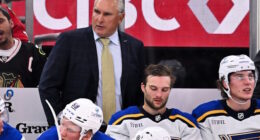So it’s been reported here and everywhere that Jonathan Toews and Patrick Kane (5 years) and Duncan Keith (up to 13 years) are about to re-sign with the Blackhawks. There has been so much talk about the inevitable signings and cap issues that the Blackhawks have, that I didn’t really want to bring them up again. Pretty much every sports site and blog dating back to last July have touched on their issues on numerous instances (from mynhltraderumors – Capoligist needed in Chicago July 8th, and Hossa’s Contract Investigation July 31st). We all know that they are going to have to make a trade or 2 to free up cap room for next season, and that Brian Campbell and Cristobal Huet are 2 contracts that they’d probably like to remove, rather than a Patrick Sharp or Kris Versteeg.
But why am I writing about them then? This blame lies with Tab Bamford of the BleacherReport commenting on an ESPN article. Before the Blackhawks are able to officially sign the big 3, they must makes some moves that effects next years salary cap, the ‘Tagging’ rule.
“Tagging” is a rule in the CBA that prohibits a team from having more money committed to the following season than the current year’s salary cap. Essentially, if this year’s salary cap is roughly $56 million, the Hawks wouldn’t be allowed to have the projected $61 million committed to next year’s payroll after these three deals were completed.
I had never heard of this rule before, and it raises a few questions. Were the ‘Hawks aware of this ‘tagging’ rule? Will the Hawks’ become more active in trying to dump salary so they can announce the 3 signings asap, or will they hold on to the signed contracts and file them later on in the season? At what cost will the ‘Hawks go to, to move out salary (packaging a contract and a good draft pick/prospect for a lower salary)?



